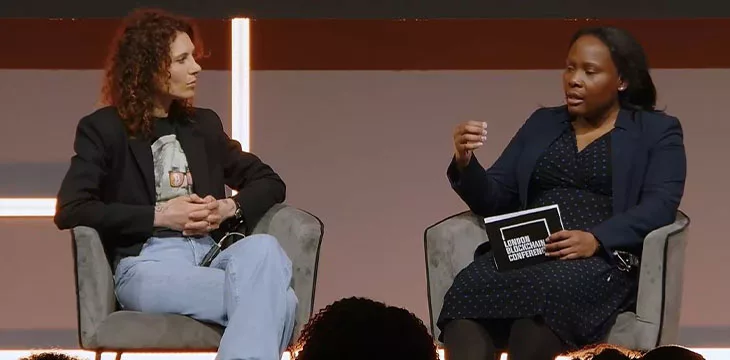Artificial intelligence and blockchain are two of the most used buzzwords in the last 12-24 months. For a time (and arguably still today), a company needed to mention a single word to interest its investors and drive up share prices.
But as tempting as it is to be cynical about zeitgeists like these, there are solid reasons why the appeal of either concept is so powerful. That's because the hype has a basis.
So, naturally, the AI-enhanced Blockchain session on Day 2 of the London Blockchain Conference 2024 was one of the better-subscribed ones. Two leaders took the stage to discuss the transformative potential of integrating artificial intelligence into blockchain operations: Ijeoma Okoli, Director of the Economy Initiative at Digital, joined moderator Stefania Barbaglio, founder of Cassiopeia;
Okoli is a former financial lawyer with US and UK regulatory experience, and this is the vantage point from which she examines these two technologies. Barbaglio dives into the deep end: How can AI help make blockchain more efficient?
“Sometimes people talk about emerging technologies looking for a problem,” Okoli said. “That's true to some extent, but in other ways, it's not true.”
“We know that blockchain has been around for a while and traditional financial services organizations are not only adopting blockchain in the local crypto sector. But with the birth of ChatGPT and the explosion of AI in the world in 2022, people will be embracing blockchain. Looking at the problems inside and how AI can help solve some of those problems.”
One of these issues is about scalability. Okoli says transaction speed limits blockchain growth. Looking at BTC and Ethereum: BTC, on average, processes 7 TPS, while ETH processes 30 TPS. Financial services payment service providers are dwarfed by this. Visa (NASDAQ: V ), for example, processed 6,800 TPS. This is a huge disparity. Not only that, transaction speeds for the likes of BTC and ETH usually slow to a crawl during heavy congestion.
Okoli says that in light of AI's ability to analyze data and then use it to make predictions, it makes sense to use the technology to project the duration of congestion in the blockchain ecosystem. can
As another example, Okoli looks at Ethereum's sidechain solutions, which are commonly referred to as one of two types of 'rollups': zero-knowledge rollups and optimistic rollups. The former sees transactions validated off-chain and then added to the blockchain using zero-knowledge proofs. The latter form treats all transactions as genuine unless a verifier disputes their validity. Okoli says it could take up to two weeks for such verification to take place. Outsourcing this validation to AI can dramatically reduce this variability.
Okoli also says that in addition to analyzing data on-chain (or waiting to be deployed), it can audit blockchain applications for vulnerabilities. Instead of waiting for software to be exposed to the world and then relying on white hats or black hats to discover any exploits, AI can do this quickly and efficiently.
The same can be said for fraud detection. Okoli brought up last year's Ethereum hack to illustrate. In April, there was an exploit on the Ethereum blockchain where validators manipulated the vulnerability to make $25 million. What was important here was that this was the first exploit of its kind, highlighting a weakness in the post-merger authentication process that was only discovered when it was being exploited. So, Okoli says, AI could be used to audit and detect vulnerabilities before bad actors commit them, but detect them when exploits start to be used to steal money. I would have helped too.
Next, Barbaglio asks: What about the challenges of integrating AI with blockchain?
Perhaps not surprisingly, given Okoli's background, the answer was: regulation. Now, though, as these two technologies have already begun to work their way into the minds of lawmakers and regulators, the issue is more complicated than many of the regulatory frameworks that have become law or are on their way over the past 12 months. are making
Just this week, new artificial intelligence legislation went into effect in the European Union, Okoli explains. She calls it 'the first of its kind in the world, specifically focusing on AI.'
“To the extent that people want to incorporate AI into blockchain systems, you have to not only think about it. [EU and UK Markets in Financial Instruments] and the Securities Exchange Act, you now have to think about the EU AI Act and the obligations it imposes on you.
“It's a risk-based model,” she explains, “banning certain things. But it has extraterritorial impact. So just because you're not in the EU doesn't mean you have to. No need to pay attention.
Okoli explains that the act requires risk assessment, disclosures, and cooperation with authorities. She also cautions that while this is the first AI-based legislation, it won't be the last.
Okoli also points out that AI and blockchain share a key challenge facing these technologies themselves: interoperability.
“Every time we're in a situation where something new happens and regulators around the world have to work to the extent that they're racing against time, what we get is That there is an implication where things are global, that the activities they seek to influence are not limited to the territorial waters of a particular jurisdiction.”
For artificial intelligence (AI) to function properly within the law and meet the growing challenges, it needs to integrate an enterprise blockchain system that ensures the quality and ownership of data input—this Allows data to be protected and also guarantees immutability. of data Check out CoinGeek's coverage Learn more about this emerging technology Why Enterprise Blockchain Will Be the Backbone of AI.
See: Blockchain and AI — These Techs Must Converge
New to Blockchain? Check out CoinGeek's Blockchain for Beginners section, the ultimate resource guide to learn more about blockchain technology.
